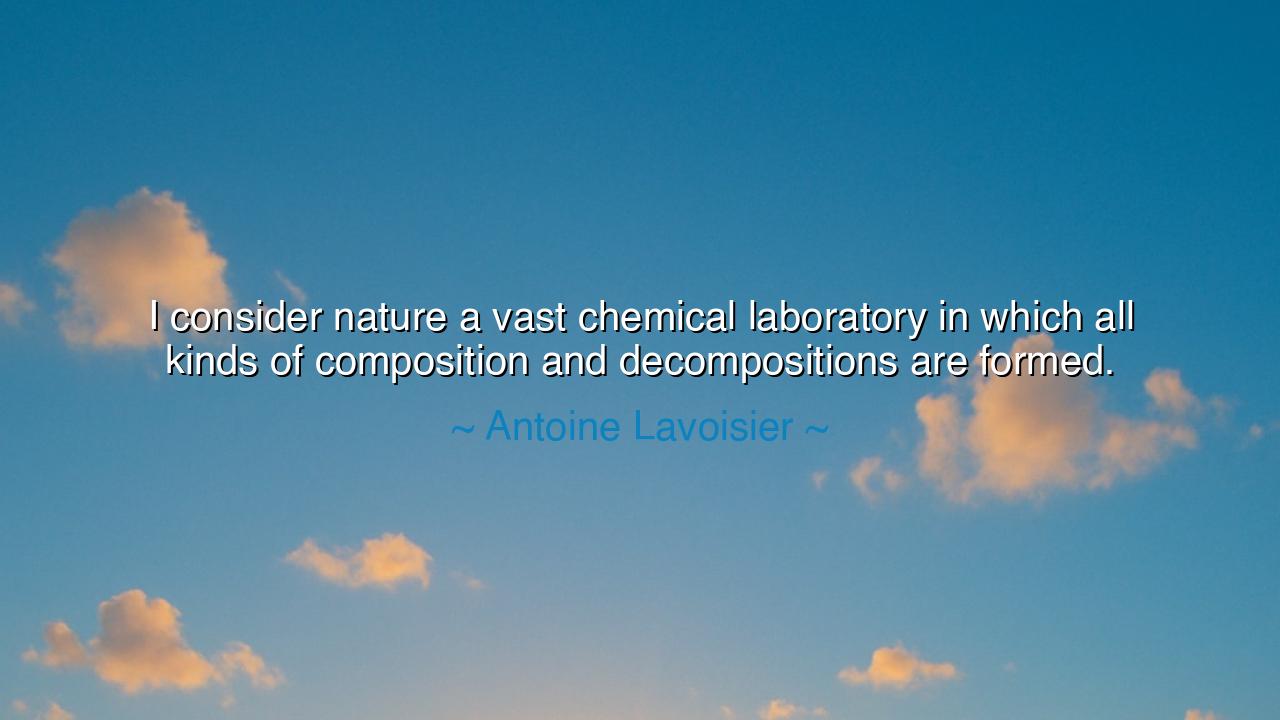
I consider nature a vast chemical laboratory in which all kinds
I consider nature a vast chemical laboratory in which all kinds of composition and decompositions are formed.






Antoine Lavoisier, the father of modern chemistry, once declared: “I consider nature a vast chemical laboratory in which all kinds of composition and decompositions are formed.” In these words, he opened a window into the hidden workings of the universe, revealing that the world is not chaos, nor blind chance, but a grand and ordered workshop. Every breath, every flame, every drop of water, every sprouting seed—these are experiments already in motion, orchestrated by the laws of matter. To Lavoisier, nature was not still life, but ceaseless transformation, a furnace where elements unite, divide, and unite again.
The origin of this quote lies in Lavoisier’s tireless study of the elements. In an age when alchemy still lingered, he stripped away superstition and declared with clarity: matter is neither created nor destroyed, but transformed. He saw that fire was not some mystical force but the union of oxygen with substance; that respiration itself was a chemical reaction, the burning of life’s fuel within our bodies. To him, the earth, the seas, the air were not separate realms but parts of one vast laboratory, governed by the same laws. His mind did not see mere surface beauty in the green of the forest or the blue of the sky; he saw equations written by the hand of creation itself.
The ancients had glimpses of this truth. Empedocles spoke of the four elements—earth, air, fire, and water—mixing and separating to form all things. The Stoics believed in a logos, a rational fire that pervades the cosmos. But Lavoisier, with the keen instruments of experiment, gave flesh to their vision. He measured, he weighed, he proved. Where they saw myth, he saw oxygen and hydrogen, acids and bases, composition and decomposition—the eternal dance of matter under nature’s law.
History itself provides a living parable. Consider the eruption of Mount Vesuvius, which buried Pompeii in ash. To the terrified citizens, it was the wrath of gods. But to the eyes of science, it was nature’s laboratory in fury—rocks melted, gases released, new compounds forged in fire. What seemed destruction was also transformation, for from that volcanic soil new life would one day spring. Lavoisier’s words remind us: even in devastation, nature is at work, never idle, always transforming.
The meaning of this vision is not only scientific but spiritual. To see the world as a vast laboratory is to recognize that all is process, all is change. Nothing is wasted, nothing is lost—matter shifts its form, but remains eternal. In this truth lies comfort: the body that dies becomes soil, the soil feeds the tree, the tree feeds the living once more. The cycle of composition and decomposition is the very rhythm of life, written into every heartbeat and every falling leaf.
The lesson for us is clear: do not see nature as static, but as alive with motion. Respect its processes, for they sustain us. The food we eat, the breath we take, the warmth of fire—all are gifts of this vast laboratory. And let us also see in our own lives the same truth: our struggles, our failures, even our endings are not final—they are transformations, breaking down the old to make room for the new.
Practically, we must walk with reverence in this laboratory. Waste nothing, for nature wastes nothing. Observe closely, for every simple act hides profound laws. And cultivate patience, for transformation takes time: the seed must decompose before the plant can rise, the ore must be refined before the metal shines.
Thus, Lavoisier’s words endure as a hymn to the eternal workshop: “I consider nature a vast chemical laboratory in which all kinds of composition and decompositions are formed.” Let us honor the wisdom of this vision, living as apprentices in the great laboratory of life, where every flame, every storm, every breath is both experiment and lesson, teaching us the indestructible truth of transformation.






AAdministratorAdministrator
Welcome, honored guests. Please leave a comment, we will respond soon